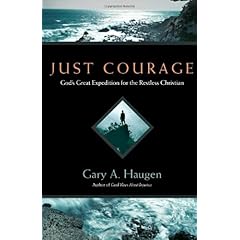
Just Courage: God’s Great Expedition for the Restless Christian
By Gary A. Haugen
(InterVarsity Press: 978-0-8308-3494-5, HB, 150 pages)
Would you rather be safe or brave? Do you want to have a life that is successful or a life that is significant? Gary Haugen challenges Christians with these questions in Just Courage.
Gary Haugen is the founder of International Justice Mission, an organization that defends those who cannot defend themselves against injustice around the world—slaves, women and children imprisoned in brothels, the dispossessed, and the attacked.
Haugen sees a generation of Western Christians who are bored and dissatisfied with their Christian experience. Rejecting yesteryear’s pietism, they want something more. But they don’t know what that “more” is or how to reach it.
However, “more” is found in following Jesus, and that “is about loving people in need.” (page 116) Drawing on Isaiah 1:17, Isaiah 58:10-11, and similar passages, Haugen defines justice from a biblical perspective, rejecting the popular Marxist redistributionist theory. Haugen notes that we can understand justice by looking at it its inverse, injustice, which is “the abuse of power—abusing power by taking from others the good things that God intended for them, namely, their life, liberty, dignity, or the fruits of their love or their labor.” (page 46)
Using examples of those who have followed Jesus in the fight for biblical justice in the past, those who are fighting injustice today, and the needs of victims, Haugen asserts that Christians can find significance in their lives as they join with Jesus in loving needy people.
Though he presents the philosophical and theological arguments for promoting justice, this is not a dry theological tome. Rather it is an engaging, lively discussion based on the teachings of Jesus to inspire readers to venture outside their spiritual cul-de-sac into a world of pain and to make a difference.
Some groups will reject Haugen’s argument. Those who reject the teachings of Jesus as irrelevant in this dispensation will dismiss it. Those who embrace pietism will turn their backs on it, and those who want to look good in the world’s eyes will disdain it.
For those seeking “more” Christ, more meaning, in their Christian walk, Just Courage may hold the key for which they are searching. His appendices offer ways to partner with International Justice Mission, a list of other organizations involved in the issues of justice, and serious questions for reflection.
Remember what Lucy said in The Lion, the Witch, and the Wardrobe when she hears of Aslan for the first time? She asks, "Is he quite safe?" The answer, of course, is, "No, he’s not safe, but he’s good." Even so, as we follow such a lion into the world, it will not be safe. But it will be good. Very good. (page 109)
Reviewed by Debbie W. Wilson
This review was originally published at ChristianBookPreviews.com Labels: book review, justice



